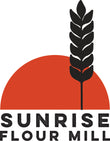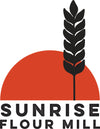Talking food and farming with Natalie and Tara, hosts of Discover AG podcast.
Photos courtesy of DiscoverAg
Natalie Kovarik and Tara Vander Dussen are the quick-witted co-hosts of Discover AG, a captivating podcast and film series that explores food, farming, and the confusingly tangled roots of the American agricultural industry.
Kovarik is a fourth-generation cattle rancher who owns and operates Kovarik Cattle Co. with her husband in the heart of Nebraska, and Vander Dussen is a fifth-generation dairy farmer and environmental scientist who works alongside her husband on their family farm in New Mexico. When the two of them get behind their microphones to talk, they have vibrant conversations about food and pop culture that gracefully dive into the fascinating intricacies of our food system in lighthearted ways.
We sat down with Natalie Kovarik and Tara Vander Dussen to learn more about who they are, discuss Discover Ag, and talk about living every day from scratch:

SUNRISE: When did you first become interested in agriculture and knowing where your food comes from?
NATALIE: I grew up on a ranch in Montana, and I always say, “My mom was MAHA [Make America Healthy Again] before MAHA existed.” We had a huge garden, she grinded our own wheat and we made our own bread. I remember being like, “Why can't I just get sugary cereal?” I have three older sisters, and I call myself a good cook, but I am the worst cook in our family. Food always brought my family together, and we had a really healthy relationship with healthy food.
TARA: It was similar in my household, growing up on a dairy farm. I remember my mom being like, “Velveeta is not cheese, and Cool Whip is not whipped cream.” She was crazy about ingredients, because she was aware that those products were mimicking our product, which was whole and good. As an adult, now I care very much about ingredients. Like, milk is a whole product, so why change it?
SUNRISE: How'd you two meet?
TARA: Like most millennials, we met online. I'm in New Mexico, and Natalie's in Nebraska, so we are obviously not close together. We met years and years ago in the early days of Instagram. There weren’t a ton of farmers sharing on social media, so we kind of started in a chat group, supporting each other, offering advice and insights, and then in March 2021 Natalie hosted a women's retreat for women in business, and we finally met in person. After that first meeting, it was a kind of a snowball effect, and we very quickly realized how many things we aligned on, so in 2022 we launched our podcast. The cool thing about the podcast space is you can sit down and have a 45-minute conversation to discuss some of these heavier topics, which held a lot of appeal, and we've honestly loved it ever since.
NATALIE: We just love to yap.
SUNRISE: So this started as a business relationship, but has it blossomed into a friendship?
TARA: When we started Discover Ag, we had friendship through social media, we both saw the value of the platform, and we figured out how to turn it into a business. Natalie and I talk all day, and we go on family trips together and have holidays together. Natalie is my best friend, and also my business partner, and I love her and our business.
NATALIE: We both have professional careers, too; I'm a pharmacist, and Tara is an environmental scientist. So when we came to our husbands and said, “We want to start social sharing,” there was an understanding that we were going to be replacing that income we were bringing from our professional degrees through whatever means we were doing at the time through social media. We're both very business minded, as Tara said, especially when it comes to how we want to spend time online. I feel like that is like such a time-suck for our generation, and so it was really important to us that there was a return on investment. But out of that business relationship, as Tara said, has come a very close friendship that has, you know, rippled out into not just us, but our husbands, our friends, our kids, and our friends.

SUNRISE: What’s the mission of Discover AG, and what do you want people to take away from it?
TARA: The short answer, as we always joke, is that we want to make agriculture cool again. People love food, and food is so interesting, but they don't always connect it back to its roots. And so whether that is people who are genuinely excited to learn more about where their food comes from, or even people within the industry within agriculture.
NATALIE: For the longest time, agriculture has been kind of stereotyped and has not kept up with current culture—it has not evolved and is idyllic of past times. Our goal is to make agriculture relevant, cool, and interesting. Food touches all of us every single day, three times a day, and agriculture is food. There's definitely a food movement happening, and everyone is talking about health and wellness, so how do we get people as excited about agriculture and our food processes as we are?
SUNRISE: Is the perception of the modern agriculture industry that it is boring or uninteresting?
TARA: Agriculture is super rooted in tradition, and some things will never change… like a healthy cow produces more milk, right? That’s never going to change, no matter what technology is out there, so from the outside looking in, it probably looks a little stale. Looking from the inside out, though, I am amazed how much more technology and innovation there is. That said, as things change and progress, it can scare consumers, because it doesn't look the way it used to look, and more technology in their food system scares them. But overall I think within agriculture, we’re progressing really quickly, and it's extremely beneficial.
NATALIE: If you look at the most-trusted professions, farmers rank really, really high, but there is so much distrust in the food system. I think that all people need is one touch point—the one grandparent, the one great uncle—who brings the trust in the relationship. Like Tara said, we are conveying to people that this is the new modern age of agriculture, and while it looks a little bit different, there are reasons we are doing what we’re doing, and hopefully it makes sense.
SUNRISE: From your perspective, can you describe the food movement that's happening right now?
TARA: COVID was the first time people went into grocery stores and there wasn't food on the shelves like in mass quantities across the nation. It impacted everyone, and it was a collective moment for us all to stop and think about where our food came from. Like, what happened for your food and your supplies to go from farm to the grocery store and not to be there? For a lot of people, I think it started a revolution that prompted people to ask more questions about their food and where it comes from. Now it is evolving and changing, because we're five years out, but I still think there were some moments in March 2020 that spurred this food movement.
NATALIE: I think we're actually at the head of it. As Tara said, I think everyone was unified in 2020 about reconnecting with their food. It started innocently, like people should think about their farmers and ranchers again, but what started innocently has gotten very intense for some people and is now very political. You know, the food movement looks different depending where you are geographically. I am in the middle of the United States, and I would say the food movement where I am is not really a food movement, right? If I went to Los Angeles, though, I’d describe an entirely different food movement than I would if I was in Georgia or Florida. For the past five years, we have all been on different journeys, depending where we are geographically and economically, but it's coming to a head, and all of it's going to get sorted out moving forward. 2025 is going to be a huge year for the food movement, and I feel like we're right now at the pinnacle, trying to sort it all out. Like, what's actually important, what's actually feasible, what's actually true? And coming out of this whole storm we just created, we will align on the future we want for America's food system. Right now we're battling it out, debating what it looks like and what policy should look like, but I see all of that getting sorted out and kind of moving into a direction where we're like, “Okay, this is it, we're unified.”
SUNRISE: In your opinion, what is the effect of “Make America Healthy Again” in this ongoing food movement?
TARA: It seems like it is breaking the movement into smaller pieces. You have the big pharmaceutical companies, that's a piece of the movement, and you have pieces like PepsiCo and Coca-Colas, which are being identified as villains of the food movement, along with chemicals, pesticides, and the like. It’s like we are peeling back layers little by little until we come to a place of transparency and trust. This is a conversation about what is being put in our food, and it should be rooted in information, not fear mongering.
NATALIE: It’s like for the first time, people are realizing that the potato farmer isn't in charge of making the potato chips that are filled with dyes or preservatives. The farmer isn't the problem, big corporations are the problem. That’s why companies like Sunrise Flour Mill are growing, because people are starting to realize that they can go back to the source and have more trust in the item that they're buying. With our food system, we got to where we are for a reason with our food system. I don't think anything bad in our food system was created with the intention of being bad, but rather was created to solve a problem, like easy-to-break glass bottles being replaced with aluminum cans that leach chemical contamination.

SUNRISE: How do we start to build a stronger connection to our food, rooted in an understanding where it comes from and our appreciation of how our food process works?
TARA: Most Americans have a grandparent, a great uncle, or someone like that from way back who worked in farming, and that's where their story ends. 50 to 75 years ago is the last touch point that someone had with a farm, genuinely in their family, and society has progressed exponentially over the last 50 to 75 years. Agriculture is no different, yet I think that people's timeline of agriculture stopped 50 to 75 years ago, and it's really hard for them to catch up. When they hear things like pesticides or GMOs, or they see organic or whatever marketing label on their food, it brings up a lot of confusion and a lot of fear, because there's this massive gap in knowledge, which can either be filled with accurate information or be filled with misinformation and fear. People don't understand the roots beneath different terminologies or why things are being used, or how things have progressed, or what technologies we're now implementing. We have these consumers who are still, like, living in the 1950s, and now we're trying to bring them to the present. If they knew more about the present, I think that they’d be equally excited and have a basic understanding to not allow that gap to be filled with fear, but instead allow it to be filled with truth.
NATALIE: That’s one of the most important parts of our job. We are a modern-day cattle rancher and a modern day dairy farmer, bringing you this food content. I know a lot about the beef industry, and Tara knows a lot about the dairy industry, and we bring our audience along for the ride the best we can. Looking at who else is talking about food, it is doctors, wellness influencers, mom—and there is a gap in knowledge. Understandably, when you are three generations removed from a farm or a ranch, that gap is filled with questions, and it is our job to package factual information in a fun way. It’s our continued challenge every single episode: how do we balance some of these real conversations going on agriculture, about MAHA and the food movement, but balance them with where our food production is currently, and maybe where the changes we want to see them go?
SUNRISE: What are you most looking forward to in the next chapter of Discover Ag?
TARA: 2025 is a really big year for us. We’ve put in a ton of work, we've been at this for a while, and now we can feel it, we can see it, we can taste it—we know what this can be. This current food movement is so exciting, with everyone talking about how food is raised and produced, and we’re proud that Discover Ag is a part of that conversation.
SUNRISE: For you, what does it mean to live “every day from scratch”?
TARA: I think of those slow Sunday mornings, waking up and baking with my girls. It’s about saying “no” to things just to make space for the slowness, the nothing. Just take a pause … enjoy a moment to make something.
NATALIE: At its core, it stands for being in the kitchen, which is a place I love to be, like, making food and feeding my family. On a macro level, I think about a way I want to live my life, too, where I'm making time for those things that I really enjoyed before we spent our lives so fast paced and so online. “Every day from scratch” means being intentful with our time, with your life, and with what you’re creating … It's about nourishing yourself.



















